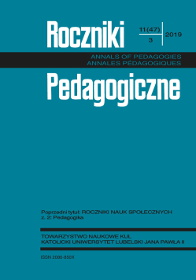The Fathering of a Deaf Child from the Perspective of the Ecosystem Paradigm
Main Article Content
Abstract
The article focuses on the theoretical approach to the review of literature on the subject of paternity of a deaf child from the perspective of the ecosystem paradigm. Understanding the nature of paternity requires analysis in the ecological paradigm (taking into account the impact of environmental factors: from micro- to macrosystem) and in the systemic paradigm in which it is important to know the ways and quality of interaction between family members and external social systems. The presented analysis of research and scientific reflection allows us to see the need for father’s participation in the development of the psychosocial deaf child in the course of life. In addition, in the context of the considerations taken up, one can accept the thesis that paternity is not only something natural for a person functioning in a social group, but also an expression of understanding the needs of all family members.
Article Details
References
Biddulph, S. (2011). Męskość. Przeł. A. Jacewicz. Poznań: Dom Wydawniczy REBIS.
Bronfenbrenner, U. (1993). The ecology of cognitive development: Research models and fugitive findings. W: R. Wozniak, K. Fischer (eds.), Development in context: Acting and thinking in specific environments (s. 3-44). Hillsdale, NJ: Erlbaum.
Bronfenbrenner, U., morris, P.A. (2006). The bioecological model of human development. W: W. Damon, R.M. Lerner (eds.), Handbook of child psychology, vol. 1, Theoretical models of human development (6th ed.) (s. 793-828). New York: John Wiley.
Calderon, R., Low, S. (1998). Early social-emotional, language, and academic development in children with hearing loss: families with and without fathers. American Annals of the Deaf, 143(3), 225-234.
Crowley, M., Keane, K., Needham, C. (1982). Fathers: The Forgotten Parents. American Annals of the Deaf, 127, 38-40.
Czapiński, J. (2004). Psychologiczne teorie szczęścia. W: J. Czapiński i in. (red.), Psychologia pozytywna. Nauka o szczęściu, zdrowiu, sile i cnotach człowieka (s. 51-102). Warszawa: PWN.
Cummings, E.M., O’reilly, A.W. (1997). Fathers in family context: Effects of marital quality on child adjustment. W: M.E. Lamb (ed.), The role of the father in child development (s. 49-65). Hoboken, NJ, US: John Wiley & Sons Inc.
Fijałowski, W. (2011). Ekologia rodziny. Ekologiczna odnowa prokreacji. Kraków: Wydawnictwo Rubikon.
Goldenberg, H. Goldenberg, I. (2006). Terapia rodzin. Przeł. M. Łuczak, M. Młynarz, K. Siemieniuk. Kraków: Wydawnictwo UJ.
Kasprzak, T. (2004). Tajemnica ojcostwa. Niebieska Linia, 1, 3-6.
Kielar-Turska M. (1992). Dziecko i komunikacja. Jak dziecko staje się kompetentne komunikacyjnie? Wychowanie w przedszkolu, 6, 320-330.
Kłys, J. (1999), Jak rozumiem ojcostwo. Studia nad Rodziną, 3(2), 133-144.
Kornas-Biela, D. (2000). Ekologia łona ekologią świata. O nowy paradygmat w ekologii. W: Dołęga J.M., Czartoszewski J.W. (red.), Ekologia rodziny ludzkiej (s. 103-105). Olecko: Wydawnictwo Wszechnicy Mazurskiej.
Lamb, M.E. (1975). Fathers: Forgotten contributors to child development. Human Development, 18(4), 245-266.
Lamb, M.E., Pleck, J.H., Levine, J.A. (1985). The role of the father in child development: The effects of increased paternal involvement. W: B.B. Lahey, A.E. Kazdin (eds.), Advances in clinical child psychology (vol. 8, s. 229-266). New York: Plenum.
Lundy, B.L. (2002). Paternal socio-psychological factors and infant attachment: The mediating role of synchrony in father-infant interactions. Infant Behavior & Development, 25(2), 221-236.
Malinowski, B. (2005). Małżeństwo, pokrewieństwo, W: A. Mencwel (red.) Antropologia kultury. Zagadnienia i wybór tekstów (s. 303-334). Warszawa: Wydawnictwo Uniwersytetu Warszawskiego.
Matuszkiewicz, W. (2001). Przewodnik do oznaczania zbiorowisk roślinnych Polski. Warszawa: Wydawnictwo Naukowe PWN.
Meissner, K.W. (2001). Ojciec – potrzeby dziecka a wzorzec męski. W: D. Kornas-Biela (red.), Oblicza ojcostwa (s. 193-199). Lublin: Towarzystwo Naukowe KUL.
Mierzwiński, B. (1999). Mężczyzna istota nieznana. Warszawa: Oficyna Wydawniczo-Poligraficzna „ADAM”.
Miller, I.W., Ryan, C.E., Keitner, G.I., Bishop, D.S., Epstein, N.B. (2000). The McMaster Approach to Families: Theory, Assessment, Treatment and Research, Journal of Family Therapy, 22(2), 168-189.
Nagórny, J. (2001). Posłannictwo ojca w kontekście współczesności. W: D. Kornas-Biela (red.), Oblicza ojcostwa (s. 59-81). Lublin: Towarzystwo Naukowe KUL.
Petri, H. (2012). Dramat braku ojca. Poznań: Flos Carmeli.
Plutecka, K. (2017). Z historii edukacji osób głuchych mieszkających na terenach należących do Stanów Zjednoczonych. Rocznik Komisji Nauk Pedagogicznych, LXIX, 5-13.
Poli, O. (2008). Serce taty. Niezbędnik każdego ojca. Przeł. E. Łukaszyk, Kraków: Wydawnictwo WAM.
Półtawska, W. (2000). Ojcostwo – los czy wybór? Wychowawca, 5, 6-9.
Pulikowski, J. (2001). Czy w dzisiejszych czasach warto być ojcem. W: D. Kornas-Biela (red.), Oblicza ojcostwa (s. 95-124). Lublin: Towarzystwo Naukowe KUL.
Sak, J. (2006). Rozważania o ekofilozofii: od ekologii do astheneologii. Diametros, 9, 165-172.
Sitarczyk, M. (2002). Międzypokoleniowa transmisja postaw wychowawczych ojców. Lublin: Wydawnictwo UMCS.
Świętochowski, W. (2014). Rodzina w ujęciu systemowym. W: I. Janicka, H. Liberska (red.), Psychologia rodziny (s. 21-45). Warszawa: PWN.
Świerczek, A. (2010). Odpowiedzialne rodzicielstwo w nauczaniu Jana Pawła II. W: M. Duda (red.), Odpowiedzialne rodzicielstwo wobec wyzwań XXI wieku (s. 13-29). Kraków: Wydawnictwo Św. Stanisława BM.
Wójcik, M. (1999). Rodowód ojcostwa. Studia nad Rodziną, 3(2), 29-40.
Zalewska, M. (1998). Dziecko w autoportrecie z zamalowaną twarzą. Psychiczne mechanizmy zaburzeń rozwoju tożsamości dziecka głuchego i dziecka z opóźnionym rozwojem mowy. Warszawa: Wydawnictwo Jacek Santoski & Co.

